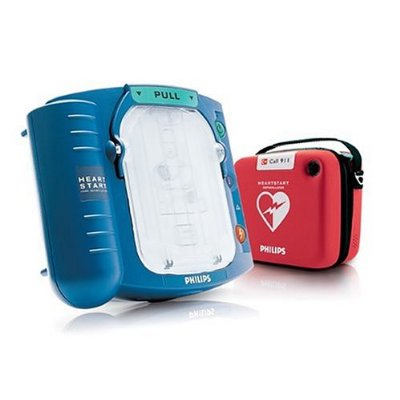Informed consumers fuel double digit increases in sales of defibrillators specifically manufactured for home use
One of the fastest-growing markets in healthcare is the sale of defibrillators to consumers for home use. In fact, independent market research publisher Kalorama Information expects defibrillators for home use to be the number one growth item in the home care products industry through 2014!
Dark Daily believes the rapid growth in defibrillators for home use is an auspicious sign for the clinical laboratory testing industry. It demonstrates the willingness of consumers to take on the responsibilities for sophisticated medical procedures performed at home. That will include a wide range of medical laboratory tests, designed specifically to be used by consumers in their homes.
Clinical laboratory managers and pathologists may be surprised at how robust the demand for home-use defibrillators is turning out to be. In a recent report, Kalorama stated that, though the rest of the home care products market is expected to grow by only 2.2% through 2014, the home defibrillators segment is expected to grow at a whopping 17.1% during the same period.

(The Philips HeartStart Home Defibrillator (AED). Sourced from Amazon.com.)
This robust demand by consumers is not likely to go unnoticed by companies developing medical laboratory test kits that can be used by consumers. However, one hurdle to expansion of the in-home medical lab testing marketplace is the various state laws that require a physician’s signature for many types of clinical laboratory tests.
Consumer Demand for Healthcare Products such as Wheel Chairs and HIV Tests
Kalorama Information publishes market research on the biotechnology, diagnostics, healthcare, medical device, and pharmaceutical industries. In their report titled “The Market for Home Care Products, 6th Edition,” the researchers noted that in 2009, sales of defibrillators for home use were at $34.6 million and have continued to grow at a substantial pace.
“Although sales remain small compared with other home healthcare markets, the home defibrillator market is growing briskly as consumers become increasingly aware of the existence of these devices,” said Bruce Carlson, Publisher of Kalorama Information in a press release.
“Sales will also be helped along by the mounting number of private insurers and Medicare that are including them in their coverage,” he concluded.
Home defibrillators got their start in 2004 with the Medtronics LifePak, which could be purchased at Walgreens and Costco with a physician’s prescription. Then later in 2004, the U.S. Food and Drug Administration (FDA) gave clearance to Philips’ HeadStart, the first ever home defibrillator that could be purchased without a prescription. Sales of home healthcare products now exceed several billion dollars annually.
The Kalorama report covers the home care estimates and forecast for the following products:
- Ambulatory Aids
- Bathroom Safety Supplies
- Home Care Beds
- Wheelchairs
- Miscellaneous Patient Aids
- Infusion Products
- Nutritional Supplements
- Peritoneal Dialysis
- Hemodialysis
- Nebulizers
- Oxygen Concentrators
- Oxygen Systems
- Ventilators
- Blood Glucose Monitors
- Ambulatory Cardiac Monitors
- Obstetric Monitors
- Sleep and SIDS Monitors
- Incontinence Supplies
- Defibrillators
- Ostomy Products
- Pressure Relief Products
- Transcutaneous Electrical Nerve Stimulation (TENS) units
- General Supplies
Where are the Medical Tests?
Conspicuous by their near total absence in the Kalorama report on the home care market are medical laboratory tests that can be ordered without a prescription. Pathologists and clinical laboratory managers might want to consider the fact that, in 2004, FDA cleared the home defibrillator—a potentially lethal device—for sale directly to consumers without a physician’s order or prescription. Thus, in the future, might the FDA be willing to clear certain clinical laboratory tests for purchase and use by consumers without a physician’s prescription? This is an interesting question.
After all, there are numerous healthcare experts who believe that consumers can’t be trusted to make decisions concerning the use of sophisticated healthcare technologies (including many medical laboratory tests) and complicated medical procedures. This is one argument used to justify laws that prevent a consumer from directly ordering a medical laboratory test in certain states across the country.
With that in mind, however, the increasing demand by consumers for home defibrillators is an interesting development. This rapidly growing market supports the argument that at least some consumers are motivated and willing to assume the responsibility of using defibrillators in a home setting if it means better outcomes for their family members.
The fact that the FDA has approved home defibrillators for consumer purchase without a prescription shows that even certain healthcare regulatory bodies recognize that patient self-care can be safe and appropriate.
The momentum in the healthcare marketplace seems to increasingly favor having consumers take greater responsibility for their own healthcare. In the future, there are likely to be further reforms that allow consumers to order more types of clinical laboratory tests without the need for a physician. But for this to happen, existing state laws that forbid consumers from ordering medical tests without a physician’s order will need to be repealed.
—Michael McBride
Related Information:
Defibrillators for Home Use Promise Big Revenue Growth
The Market for Home Care Products, 6th Edition
FDA Clears the Philips HeadStart Home Defibrillator for Over-the-Counter Sale




There are still too death by heart attack, I hope that people will be equipped with defibrillators seriously in the years to come …